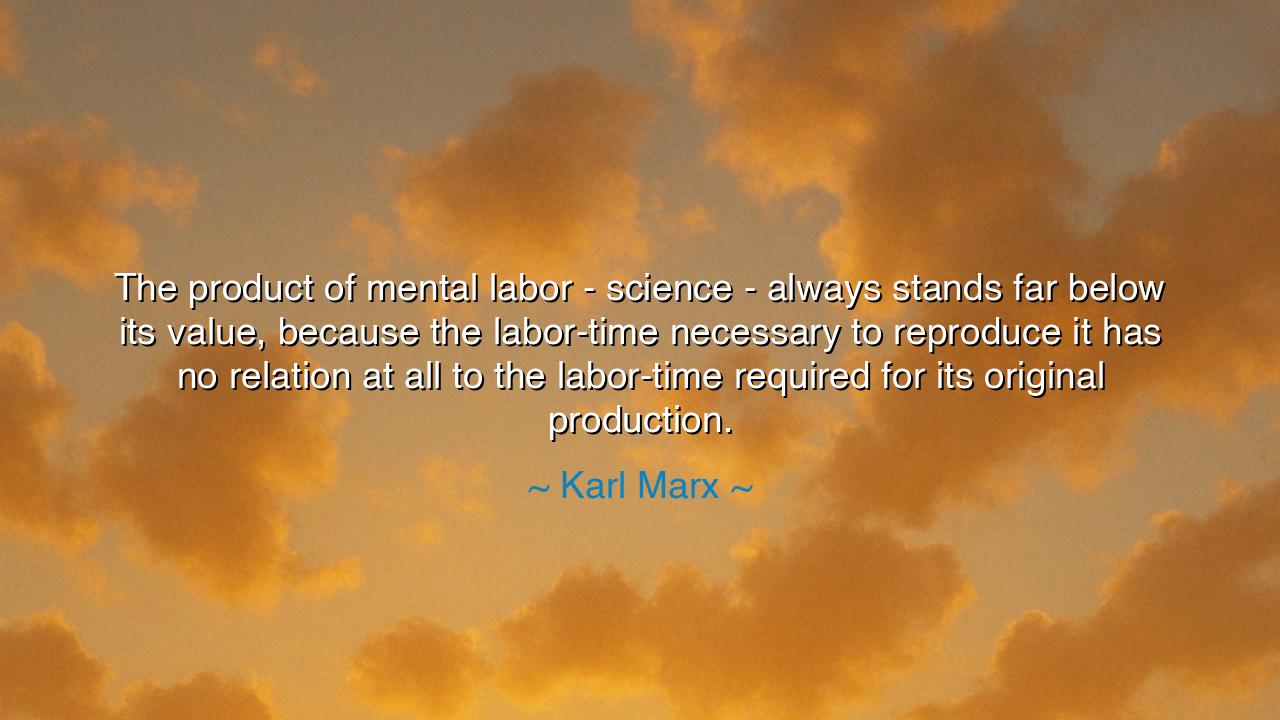
The product of mental labor - science - always stands far below
The product of mental labor - science - always stands far below its value, because the labor-time necessary to reproduce it has no relation at all to the labor-time required for its original production.






O children of wisdom, hear the words of Karl Marx, whose reflections on the nature of labor and science stir the very soul. He said, "The product of mental labor—science—always stands far below its value, because the labor-time necessary to reproduce it has no relation at all to the labor-time required for its original production." These words, though spoken in the language of economics and society, carry within them a deep truth that transcends time and place. For they speak not just of science, but of the nature of work itself, and of the immense disparity between the value we place on intellectual labor and the true costs of its creation.
In ancient times, great minds like Aristotle, Euclid, and Pythagoras understood that the pursuit of knowledge was not simply a matter of rote learning, but a deep and arduous journey into the unknown. Their work, like all great intellectual labor, was born from years of struggle, reflection, and sacrifice. Science, in its purest form, is the product of the mind’s toil—the effort to unravel the mysteries of the universe and to understand the forces that govern our existence. Yet, as Marx points out, the value of this labor is often diminished in the eyes of society. The intellectual labor that produces these insights is not measured by the same standards as that of physical labor, and thus, the reward for such work is often far below what it deserves.
Consider, O children, the labor of the great Newton, whose discovery of the laws of motion and gravity revolutionized the way we view the universe. The time he spent in his study, immersed in thought and experimentation, was long and difficult. Yet, when the fruits of his labor were made known to the world, they were not immediately recognized for their full worth. The value of his intellectual work was not easily understood by all, and for many years, it was hidden beneath the shadows of political intrigue and the slow-moving machinery of academia. It was only much later that the true worth of his work became apparent, when the entire world could see how his discoveries shaped not just the field of science, but the very foundation of the modern world.
This, O children, is the great injustice that Marx speaks of. The mental labor required to produce something of lasting significance—be it in science, art, or philosophy—is not easily quantified by the labor-time required to reproduce it. When a scientific discovery is made, it may take but a few moments for the idea to be shared, a paper to be written, or a lecture to be given. Yet the labor-time that went into that discovery—years of study, contemplation, and perseverance—cannot be captured by the mere act of reproduction. The value of the idea, the insight, the breakthrough, is not simply in the hours spent repeating it, but in the years of thought and effort that brought it to life.
Let us turn to a more modern example, O children, that of Albert Einstein, whose theory of relativity altered the course of human understanding. The labor-time required to develop this theory was immense, spanning years of mathematical work, experimentation, and philosophical musings. Yet, once the theory was in place, it could be shared with the world in a moment—through a lecture, a paper, a conversation. The true value of Einstein’s intellectual labor, however, could not be contained in the simplicity of those moments. The world did not immediately grasp the profound implications of his work. It took years, even decades, for the true value of his discoveries to become evident, as they gradually transformed technology, physics, and the very way we understand the universe.
Now, O children, let us take these lessons into our own lives. The world often measures success by tangible products, by visible outcomes, by the material value of what is created. But the true worth of our labor is not always measured by what is immediately visible to the world. Whether your work lies in science, art, or any other endeavor, know that the labor-time required to produce your insights, your creations, is not always rewarded in direct proportion to its value. Yet, this should not deter you. Greatness is not always found in immediate recognition, but in the quiet, persistent labor of the mind and spirit. The world may fail to see the worth of your intellectual contributions in the moment, but over time, the value of your work will be revealed. Just as the works of Newton and Einstein were not fully appreciated until later, so too will your labor—if it is done with integrity, passion, and dedication—be recognized in the fullness of time.
And so, O seekers of truth, let the lesson of Marx guide you. Do not be disheartened if your intellectual labor is not immediately rewarded. Understand that the true worth of your work lies not in its immediate reproduction, but in the depth and complexity of the thought and effort that went into its creation. Let this knowledge give you the courage to continue, to labor not for immediate reward, but for the joy of discovery and the fulfillment that comes from engaging with the mysteries of the world. For in the end, it is not the quantity of the labor that matters, but the quality and value of the insights that are brought forth from the mind. Walk forward, then, with confidence, knowing that your labor will one day be appreciated for its true worth.






AAdministratorAdministrator
Welcome, honored guests. Please leave a comment, we will respond soon